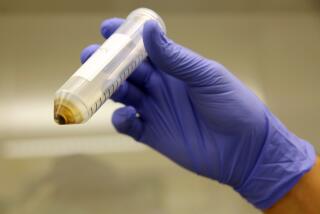Agency Retains Ban on Some Imported Wines : Trade: Action by the Environmental Protection Agency against imports with traces of a fungicide could spark another battle with Europe.
WASHINGTON — The Environmental Protection Agency, in a decision that could spark another serious trade battle between Europe and the United States, disclosed Friday that it will maintain a ban against imported wines that contain traces of a chemical fungicide.
The ruling, which is expected to block imports of certain wines for at least another year, affects as much as 20% of all potential imports of French wine and lesser amounts of wine from Italy and Spain, U.S. health officials said.
EPA does not believe that the chemical, known as procymidone and used to control a fungus that dries out grapes, poses a health hazard at the tiny levels found in the wine imports.
But under U.S. law, potential cancer-causing substances are presumed guilty until found innocent. Procymidone is not used in the United States, and the manufacturer, Sumitomo Corp. of Japan, did not apply for a U.S. permit for the substance until it was detected in wine imports earlier this year. As a result, the Food and Drug Administration has banned wines containing the substance since February until the EPA determines acceptable levels of usage.
“Our best judgment is that this is not a health problem,” said Victor J. Kimm, a top EPA pesticide official. “But we decided to put this matter in front of the public and continue to operate under the present rules.”
Wine importers wanted the EPA to grant a temporary waiver for their products, but environmental officials said they had little choice but to follow the law. The ban could cost European wine importers as much as $150 million in lost sales over the next year.
The decision, however, poses a problem for U.S. trade officials, who complained vigorously last year about a similar European ban on beef from U.S. cattle treated with a growth hormone. The hormone-treated cattle pose no health hazard, American cattle producers insist. Trade officials have put the issue on the back burner, but it remains unsettled.
“We’ve heard expressions of concern from some European trade officials,” said Victoria Clarke, spokesman for U.S. Trade Representative Carla Anderson Hills. “We’re hoping this does not set off another beef hormone situation, but we’ll have to wait and see.”
French wine importers complain that the EPA decision hits them at a particularly bad time, since lots of wine is shipped in advance of the Thanksgiving and Christmas holiday season.
“The EPA decision could have a disastrous impact on international trade relations and invite retaliatory actions by the Europeans,” warned the National Assn. of Beverage Importers in a statement.
Environmental officials contend that Sumitomo and the foreign wine growers have nobody to blame but themselves. In 1986, Chilean grapes treated with procymidone were banned, but the company has made no effort to apply for a permit.
Instead, Sumitomo apparently assumed that the FDA would not be able to detect the minuscule residues of procymidone that are left in certain foreign wines. But more sophisticated tests found traces of the chemical in several samples of imported wine this year, and the FDA has ordered a number of importers to provide proof that their wines do not contain any procymidone.
The company submitted data in April, including information that the World Health Organization has set an upper limit of tolerance 10 times above the levels found in the wines, but the EPA is not satisfied with the tests. Sumitomo officials were not available for comment Friday.
The ban currently applies to 37 different French wines, 11 Italian sparkling wines and one Spanish wine, FDA officials said. They dispute charges that the ban will seriously hurt foreign wine producers. “Fortunately, most wines don’t spoil,” said one FDA official, “and they always have the option of shipping it somewhere else.”
European growers say the chemical was not used on 1990 crops, but, apart from Beaujolais Nouveau, nearly all wines entering the market come from earlier years.
The health agency will continue spot checks on other imported wines, but officials say there is little reason for consumers to be concerned about foreign wines and that they do not expect the problem to grow.
More to Read
Sign up for Essential California
The most important California stories and recommendations in your inbox every morning.
You may occasionally receive promotional content from the Los Angeles Times.










